Navigating the world of mental health requires not just compassion, but also the best tools at our disposal. The magic of a great EHR is its potential to streamline workflows, enhance the coordination of care, and ultimately elevate the patient experience.
Now, I get it. Paperwork can be overwhelming, time-consuming, and a distraction from your core mission - patient care. Missed appointments, lost patient records, billing issues - we've all been there. But here's the good news: the right EHR can alleviate these hassles and transform the way you work. Now, let's explore some of the best mental health EHR options available—because, trust me, the right EHR could be a game-changer for your practice.
12 Best Mental Health EHR Systems Shortlist
Here's my handpicked top 12 mental health EHRs and EMR systems, evaluated and curated to ease your practice's pain points. Let's dive in!
- Lightning Step - Best for high-speed EHR solutions with intuitive user interface
- Therapy Brands - Best for integrating mental health and substance use recovery
- NextGen - Best for multidisciplinary practices needing robust functionality
- ClinicSource - Best for therapy-centric electronic medical records
- SimplePractice - Best for user-friendly and efficient therapy practice management
- Valant - Best behavioral health EHR software
- Greenspace - Best for data-driven decision making in mental health practices
- Therapy iQ - Best for streamlining administrative tasks in a therapy practice
- Psychiatry-Cloud - Best for dedicated psychiatric care with customizable features
- Core - Best for a comprehensive suite of EHR tools addressing diverse needs
- Sunwave - Best for an all-in-one solution with customizable workflows
- Procentive - Best for flexible mental health practice management, particularly for billing and revenue cycle management
What Is Mental Health EHR?
Mental health Electronic Health Record (EHR) is a digital system that stores comprehensive and confidential information pertaining to the mental health of individuals. It is utilized by mental health professionals, including psychiatrists, psychologists, therapists, and counselors, to record and manage patient data. This includes details such as diagnoses, treatment plans, medication history, progress notes, and assessment results.
Mental health EHR serves as a centralized repository of information, facilitating efficient and accurate communication among healthcare providers, ensuring continuity of care, streamlining administrative tasks, and supporting evidence-based decision-making in the provision of mental health services.
The 12 Best Mental Health EHR System Overview
1. Lightning Step - Best for high-speed EHR solutions with intuitive user interface

Lightning Step is an Electronic Health Record (EHR) platform designed for efficiency and simplicity. Its high-speed processing and intuitive user interface set it apart in the busy landscape of EHR systems, hence why it’s perfect for those seeking a solution that won't slow them down.
Why I Picked Lightning Step:
I selected Lightning Step because of its clear focus on speed and user-friendly design. This EHR tool prioritizes making work easier for healthcare providers, which is a compelling selling point in a profession where time truly counts. In my opinion, its dedication to efficient operation and an intuitive user interface gives it an edge and makes it best for those who want their EHR solution to be quick and easy to navigate.
Standout Features & Integrations:
Lightning Step offers features such as appointment scheduling, telehealth services, and detailed reporting to assist in managing your mental health practice efficiently. These features tie directly into its promise of speed and simplicity, enhancing the user experience.
Lightning Step also boasts an array of integrations with major healthcare and productivity platforms. These include options for billing, telehealth, and customer relationship management tools that can further enhance the efficiency of your practice.
Pricing:
Pricing starts from $45/user/month, with additional discounts available for larger practices.
- Pros:
- High-speed processing for efficient work
- Intuitive user interface makes navigation easy
- Wide range of integrations to suit various workflows
- Cons:
- Limited customizability may not fit all practice needs
- Telehealth services are an add-on, increasing the cost
- Support hours are limited, which may affect resolution time for issues
2. Therapy Brands - Best for integrating mental health and substance use recovery
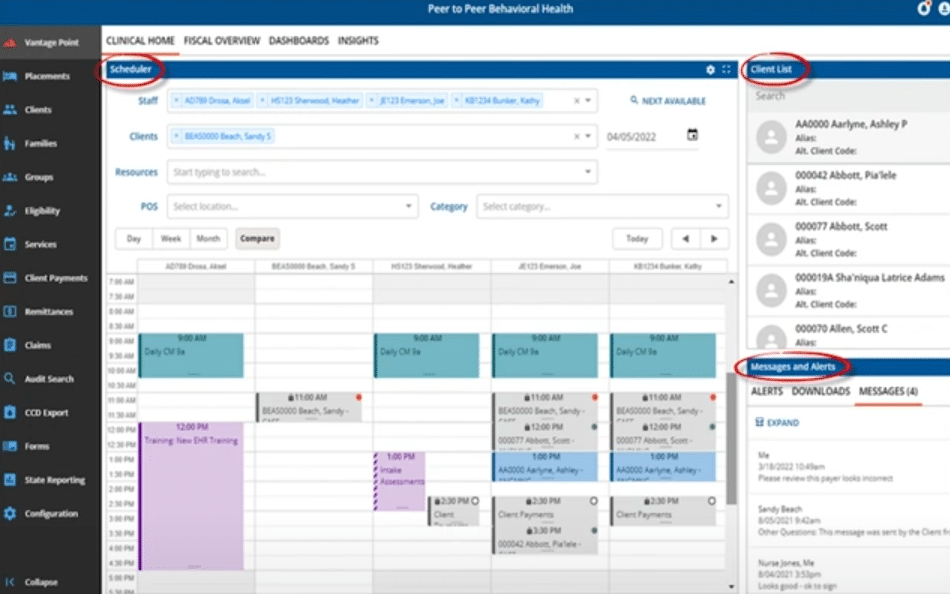
Therapy Brands provides a suite of technology solutions targeted towards the mental health and substance use recovery fields. Its distinguishing feature is its unique capability to integrate these two domains, which makes it a valuable tool for practices looking to unify their service delivery.
Why I Picked Therapy Brands:
I chose Therapy Brands because it fills a specific need in the mental health EHR space - the integration of mental health and substance use recovery. In this field, we often encounter situations where these areas overlap, and having a tool that addresses them cohesively can make a difference. Its commitment to this integrated approach makes it stand out, and it's why I believe it's best suited for practices that need to unite these two crucial areas.
Standout Features & Integrations:
Therapy Brands comes with a wide array of features, such as patient portal, telehealth services, and an integrated E-Prescribe functionality. These features enhance service delivery and help ensure a cohesive approach to mental health and substance use recovery.
With regard to integrations, Therapy Brands offers compatibility with several payment processors, electronic remittance, and clearinghouse systems. This aids in seamless billing and financial management for your practice.
Pricing:
Pricing for Therapy Brands starts from $49/user/month. This rate includes access to all primary features, with additional functionality available at extra cost.
- Pros:
- Unique focus on integrating mental health and substance use recovery
- Broad range of features for comprehensive patient care
- Variety of integrations for efficient practice management
- Cons:
- Some features are available only as paid add-ons
- Interface may be complex for first-time users
- Limited customization options might not cater to all specific needs
3. NextGen - Best for multidisciplinary practices needing robust functionality
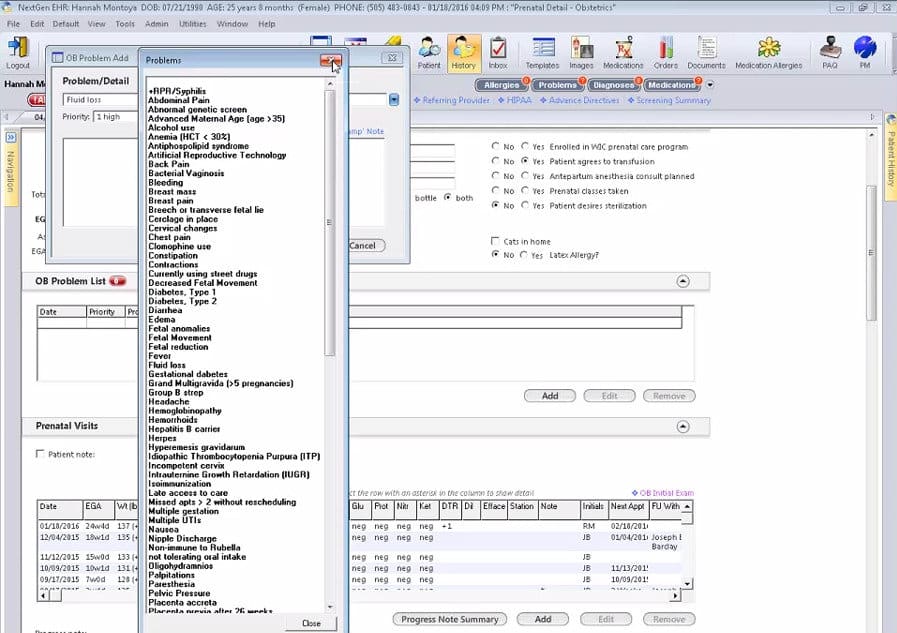
NextGen offers an EHR solution that excels in providing an extensive range of functionalities designed to support multidisciplinary mental health practices. If your team needs a diverse set of features and powerful tools to manage different aspects of your practice, NextGen is the one to consider.
Why I Picked NextGen:
I picked NextGen because it goes beyond basic EHR functionality to provide a wide-ranging toolkit for practices. It truly stands out due to the breadth and depth of its features. From my perspective, NextGen is the best fit for multidisciplinary teams because it has a robust set of tools that cater to a variety of disciplines within a single platform.
Standout Features & Integrations:
NextGen's impressive list of features includes electronic prescribing, telehealth services, client portal, and sophisticated data analytics. Each of these tools plays a critical role in delivering a comprehensive service to clients and managing the complexities of a multidisciplinary practice.
NextGen also offers a wide range of integrations with lab systems, pharmacies, billing solutions, and other healthcare software, which can significantly streamline the operations of a busy practice.
Pricing:
Pricing for NextGen starts from $199/user/month. This price gives access to the full functionality of the platform, making it an excellent investment for practices looking for a powerful, all-in-one solution.
- Pros:
- Comprehensive suite of tools to manage various aspects of a practice
- Wide range of integrations for seamless operations
- Customizable to meet specific needs of different disciplines
- Cons:
- Steeper learning curve due to the wide array of features
- Higher starting price may be a barrier for smaller practices
- Limited options for mobile access can affect flexibility
4. ClinicSource - Best for therapy-centric electronic medical records
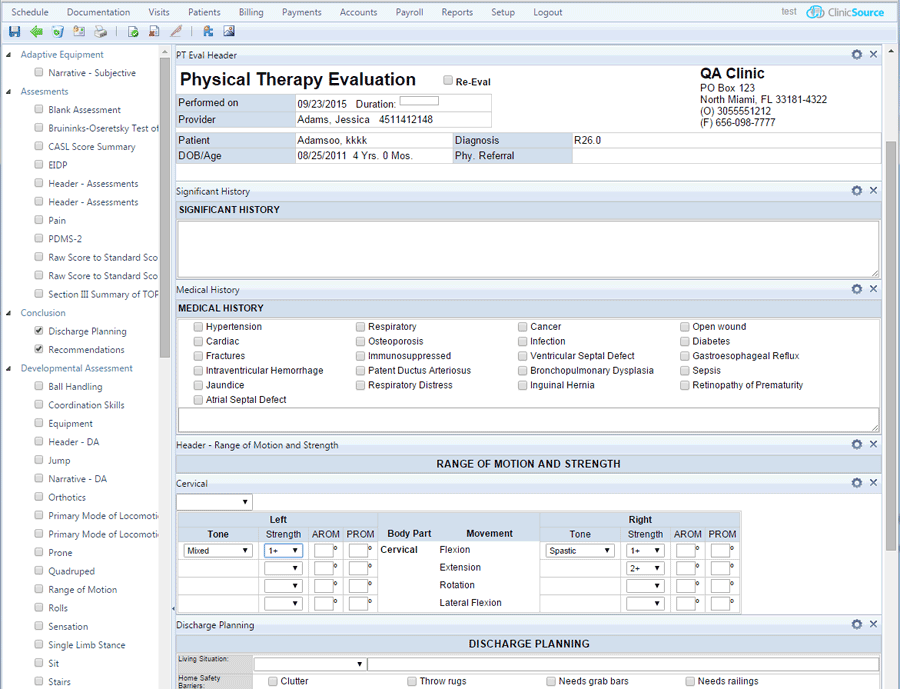
ClinicSource provides an EHR solution that's finely-tuned to meet the needs of therapy practices. It's designed with a clear understanding of the specific challenges and requirements that therapists face daily, which is why it's the best for therapy-centric medical records.
Why I Picked ClinicSource:
I chose ClinicSource because of its tailored approach to therapy practices. It is not just a general EHR software, but a system designed specifically for therapists. In a market that often overlooks this niche, ClinicSource stands out, offering features that genuinely assist therapists and make their work easier and more efficient.
Standout Features & Integrations:
The features of ClinicSource include therapy documentation, scheduling, billing, and patient records – all designed with therapists in mind. They have built-in templates for various therapy disciplines, which can save considerable time and help maintain consistency across patient records.
As for integrations, ClinicSource can seamlessly work with billing and insurance claim software. This integration helps in streamlining the financial side of the practice, reducing the administrative burden on therapists.
Pricing:
Pricing for ClinicSource starts from $59/user/month, making it an accessible choice for therapy practices of various sizes. Please note, this is the starting price, and more advanced features may come with additional costs.
- Pros:
- Designed specifically for therapists
- Offers built-in templates for various therapy disciplines
- Affordable starting price
- Cons:
- More advanced features might require additional payment
- Less suited for non-therapy medical practices
- Customer support could use improvement
5. SimplePractice - Best for user-friendly and efficient therapy practice management
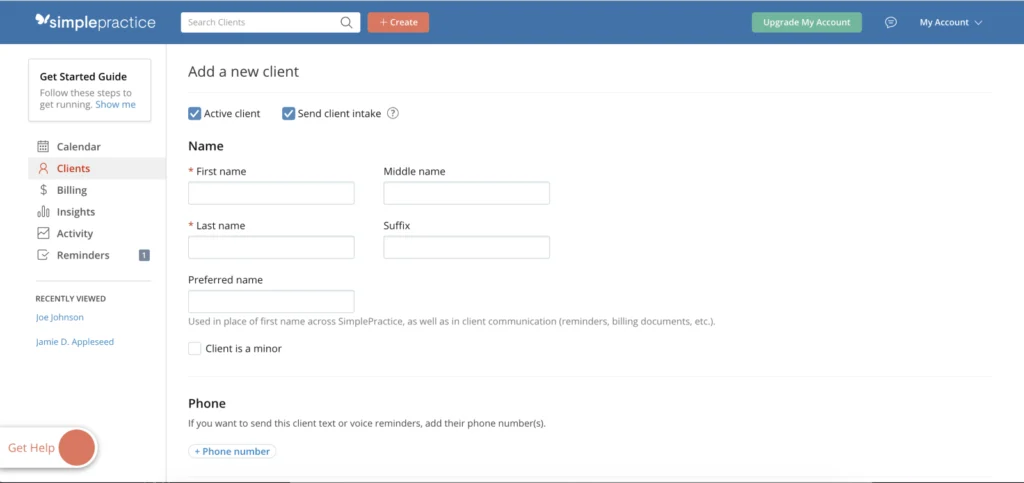
SimplePractice provides an intuitive and efficient EHR platform for therapists and other health professionals. With its user-friendly design and a rich set of features, it helps streamline practice management, justifying why it is the best for user-friendly and efficient therapy practice management.
Why I Picked SimplePractice:
I picked SimplePractice due to its commitment to user experience. Many EHR platforms can feel overwhelming with their complexity, but SimplePractice stands out by offering a solution that is both comprehensive and easy to navigate. That's why I believe it's best for those seeking a user-friendly and efficient system for their practice.
Standout Features & Integrations:
SimplePractice offers comprehensive features such as secure messaging, paperless intakes, custom note templates, and a client portal. These tools are designed to improve the efficiency of your practice, allowing you to focus more on your patients.
As for integrations, SimplePractice offers sync with Google and iCal calendars, integration with Telehealth by SimplePractice for virtual sessions, and an efficient insurance processing tool.
Pricing:
The pricing for SimplePractice starts from $39/user/month. This is the starting price for their Essential Plan, which includes the core features necessary for practice management.
- Pros:
- User-friendly interface
- Comprehensive suite of features
- Effective insurance processing tool
- Cons:
- Some features only available in higher-priced plans
- Limited customization options
- Occasional reports of slow customer support
6. Valant - Best behavioral health EHR software
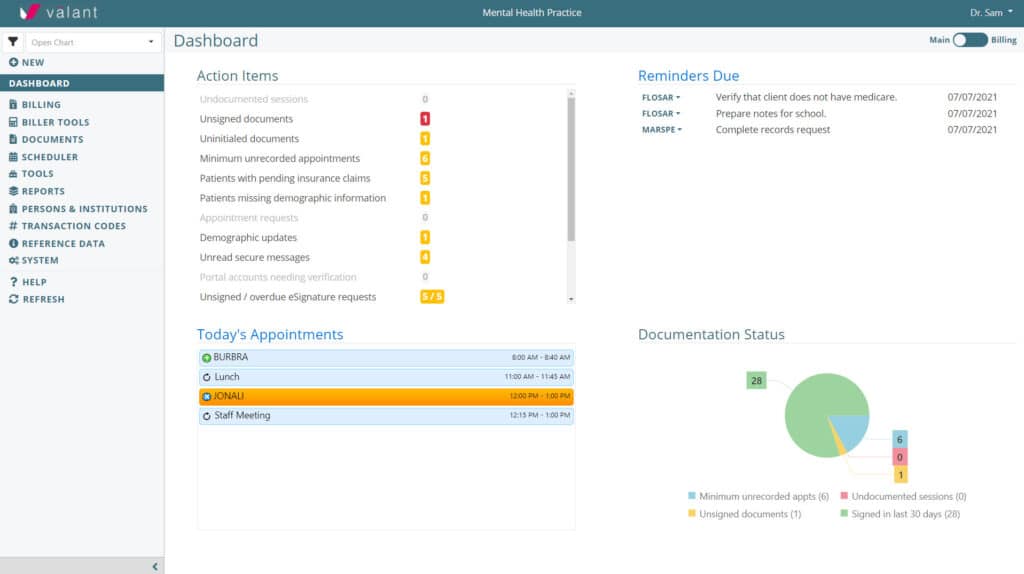
Valant is a cloud-based EHR platform specifically designed for behavioral health practitioners. It provides an extensive suite of features in a secure, online environment, thus justifying why it's the best choice for a cloud-based, feature-rich experience.
Why I Picked Valant:
I selected Valant for this list due to its cloud-based nature and a comprehensive feature set. The flexibility and convenience of being able to access records and data from anywhere is a standout aspect of Valant. This coupled with its rich set of features makes it best for a feature-rich, cloud-based experience.
Standout Features & Integrations:
Valant's features include practice management tools, billing and reporting capabilities, and secure patient portal. The practice management tools are particularly notable, including appointment scheduling, to-do lists, and notifications.
For integrations, Valant integrates with several major health systems and electronic health records, providing seamless data transfer and streamlined workflows.
Pricing:
The pricing for Valant starts from $45/user/month. This is for the Basic plan which provides access to the core features necessary for effective practice management.
- Pros:
- Cloud-based for flexible access
- Comprehensive feature set
- Integrates with major health systems
- Cons:
- Higher price point for additional features
- Learning curve for some features
- No native telehealth functionality
7. Greenspace - Best for data-driven decision making in mental health practices
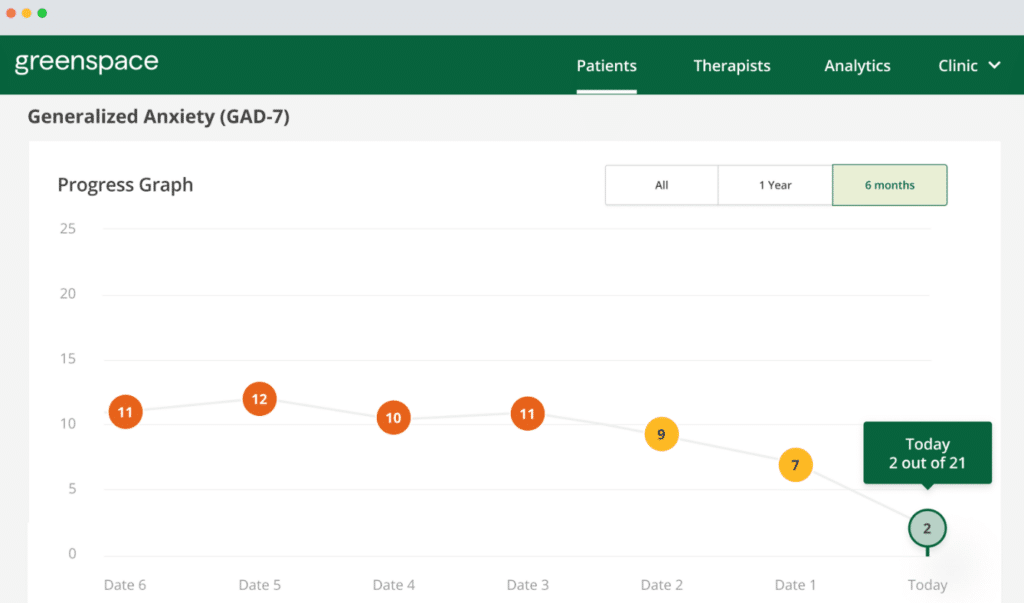
Greenspace is a mental health practice management tool that focuses on facilitating outcome-based care through data-driven insights. The platform is designed to assist mental health professionals in tracking treatment progress, which is why it stands out for data-driven decision making.
Why I Picked Greenspace:
I selected Greenspace for its unique approach to mental health treatment tracking. It enables clinicians to quantify patients' progress, thereby offering a level of insight that is not common in many other tools. This data-driven approach aligns with the current shift towards outcome-based care in mental health, which is why Greenspace is the best for this use case.
Standout Features & Integrations:
Greenspace's key features include outcome tracking, report generation, and customizable measurement tools, all aimed at driving decision-making using data. Particularly, its outcome tracking feature offers a clear, quantifiable perspective on a patient's progress.
Regarding integrations, Greenspace has partnerships with a range of other health platforms, enabling a well-coordinated care approach through interoperability.
Pricing:
The pricing for Greenspace starts at $50/user/month (billed annually). This plan includes access to all the primary features, including outcome tracking and reporting.
- Pros:
- Emphasizes data-driven decision making
- Facilitates outcome-based care
- Provides interoperability through various integrations
- Cons:
- Higher starting price point
- Focus on data may not suit all practice styles
- Annual billing may not be ideal for some users
8. Therapy iQ - Best for streamlining administrative tasks in a therapy practice

Therapy iQ is a practice management software specifically designed to simplify administrative tasks in therapy practices. It offers solutions for patient scheduling, documentation, billing, and communication, thus enabling therapists to spend less time on administration and more time on patient care.
Why I Picked Therapy iQ:
Therapy iQ caught my attention due to its comprehensive set of administrative features. It stood out for its commitment to streamline routine tasks within a therapy practice. This focus on easing administrative burden makes it an ideal tool for therapy practices looking to optimize their operations.
Standout Features & Integrations:
Therapy iQ offers impressive features such as appointment scheduling, automated reminders, customizable documentation templates, and efficient billing. These features collectively work towards reducing the time spent on paperwork and administrative tasks.
Regarding integrations, Therapy iQ integrates seamlessly with various electronic health record (EHR) systems, ensuring a smooth data flow between platforms and further easing the administrative burden.
Pricing:
Pricing for Therapy iQ starts from $30/user/month. This starting price gives access to all primary features including scheduling, documentation, and billing. (billed annually)
- Pros:
- Comprehensive administrative features
- Integration with EHR systems
- Customizable documentation templates
- Cons:
- Lacks advanced clinical features
- Pricing may be high for small practices
- Limited customization options
9. Psychiatry-Cloud - Best for dedicated psychiatric care with customizable features

Psychiatry-Cloud is an Electronic Health Records (EHR) software that's custom-tailored for the unique needs of psychiatrists. It offers comprehensive clinical content for psychiatrists, seamless insurance billing, e-prescribing, and more, making it a robust tool for mental health professionals.
Why I Picked Psychiatry-Cloud:
I chose Psychiatry-Cloud because of its commitment to serving the unique needs of psychiatrists. Its customizable features stand out and allow psychiatrists to tailor the system according to their specific requirements. This adaptability makes it the best choice for psychiatric care providers seeking customizable features.
Standout Features & Integrations:
Some of the noteworthy features of Psychiatry-Cloud include customizable templates, inbuilt Psychiatry specific codes, and a robust appointment scheduling system. These features can help psychiatrists streamline their practice while providing quality care.
As for integrations, Psychiatry-Cloud is capable of integrating with numerous lab and pharmacy systems. This helps in smooth coordination of patient care.
Pricing:
The pricing for Psychiatry-Cloud starts from $99/user/month (billed annually). This includes access to all the primary features of the platform.
- Pros:
- Customizable features for psychiatrists
- Robust appointment scheduling system
- Integration with pharmacy and lab systems
- Cons:
- Pricing might be high for individual practitioners
- The user interface might take some time to navigate
- Customer support may sometimes be slow in responding
10. Core - Best for a comprehensive suite of EHR tools addressing diverse needs
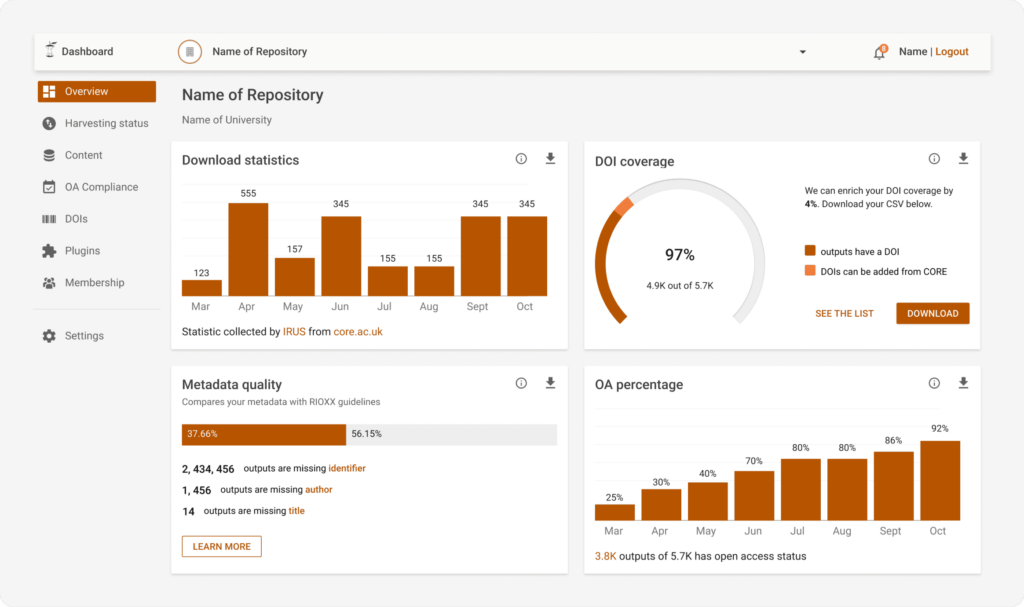
Core is a robust mental health EHR software solution designed to streamline operations and improve patient outcomes in mental health facilities. Its comprehensive feature set covers a range of needs including patient management, scheduling, and detailed documentation.
Why I Picked Core:
In compiling this list, I was particularly drawn to Core for its extensive toolset that caters to multiple facets of mental health care. Core distinguishes itself with a holistic suite of features that addresses diverse needs, from intake to discharge, and everything in between. This comprehensive nature makes it stand out as an exceptional choice for facilities that require an all-encompassing solution. I selected it as "Best for a comprehensive suite of EHR tools addressing diverse needs" because of its impressive scope of features that comprehensively address the broad needs of mental health practitioners.
Standout Features & Integrations:
Core provides a host of key features that make it a formidable player in the mental health EHR space. Its patient management tools are adept at organizing patient information efficiently. Its scheduling module helps ensure smooth operations, and its robust documentation capabilities facilitate comprehensive record-keeping. Additionally, it offers customizable treatment plans and a robust billing system.
Core also provides crucial integrations that enhance its utility. It can seamlessly connect with various billing systems and medical coding databases, easing the process of claims submission. It also integrates with telehealth platforms, expanding the possibilities for remote consultations.
Pricing:
Core offers a starting price of "From $10/user/month" (billed annually). This is a competitive price given the breadth and depth of features available. However, it's important to note that prices may increase with the addition of certain modules or integrations.
Pros:
- Comprehensive suite of EHR tools
- Customizable treatment plans
- Robust billing system
Cons:
- May require a learning curve for beginners
- Pricing can increase with additional modules
- Integration with some third-party apps may be complex
11. Sunwave - Best for all-in-one solution with customizable workflows
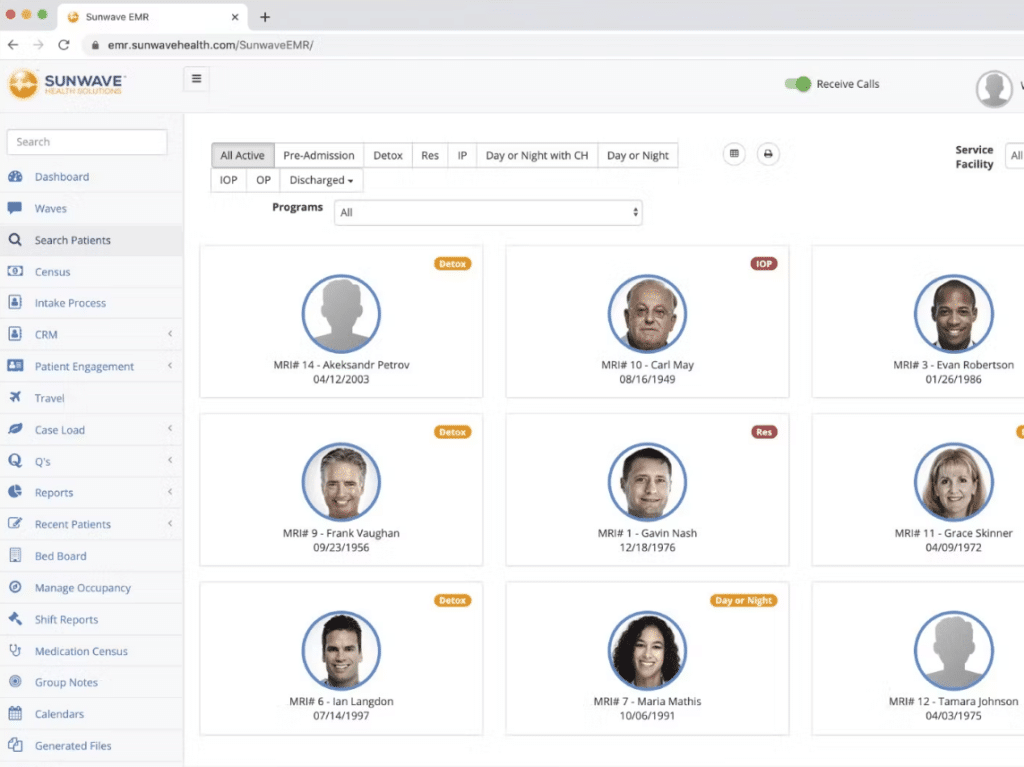
Sunwave provides a unified software platform aimed at substance abuse treatment centers. It encompasses all aspects of operations from admissions to alumni management, with a strong emphasis on customizable workflows for streamlining processes across the board.
Why I Picked Sunwave:
In comparing various platforms, Sunwave emerged as a strong candidate due to its comprehensive feature set designed specifically for substance abuse treatment centers. What sets it apart from the rest is its capability to customize workflows, fitting different needs and processes within a facility. That’s why I determined it's best for those seeking an all-in-one solution with a focus on customization.
Standout Features & Integrations:
Sunwave's platform offers a robust set of features including electronic health records, patient charting, CRM, billing, and analytics. The standout is its workflow customization, which allows treatment centers to tailor the software to their unique operational processes.
The platform integrates with numerous other software, enabling data exchange for smoother and more efficient workflows. Important integrations include insurance verification systems and laboratory information systems.
Pricing:
Pricing for Sunwave is upon request. Detailed information isn't publicly available, so you would need to contact Sunwave directly to get a quote for your facility.
- Pros:
- Comprehensive feature set tailored to substance abuse treatment centers
- Highly customizable workflows
- Wide array of integrations
- Cons:
- Pricing isn't transparent
- Might be overly complex for smaller facilities
- Customization may require more setup time and effort
12. Procentive - Best for flexible mental health practice management, particularly for billing and revenue cycle management
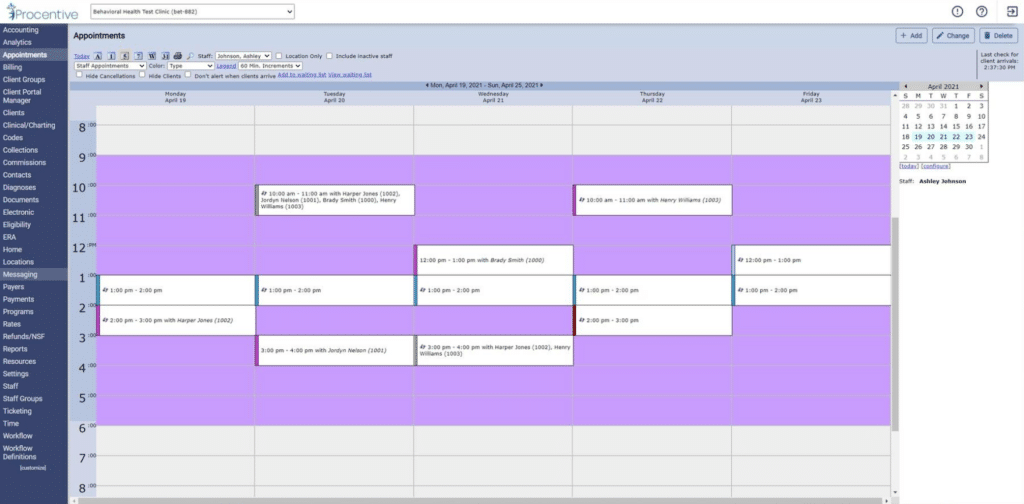
Procentive is a comprehensive Electronic Health Records (EHR) system designed for mental health professionals. It offers robust features that help streamline scheduling, documentation, and notably, billing and revenue cycle management.
Why I Picked Procentive:
I picked Procentive for this list because of its comprehensive and flexible billing system, which stands out in the market. This, combined with its other management features, makes it an excellent tool for mental health practices that want to streamline their revenue management while maintaining other aspects of their practice.
Standout Features & Integrations:
Procentive offers an extensive set of features, including customizable documentation, automatic claim tracking, and an intuitive scheduling system. But its most standout feature is the comprehensive billing and revenue cycle management system, which can greatly reduce the administrative burden for mental health practices.
Procentive also offers integrations with numerous other software systems, including major EHRs and insurance providers, ensuring smooth data exchange and efficient workflows.
Pricing:
Procentive's pricing starts from $149/user/month. It's important to note that this cost includes access to all of Procentive's key features.
- Pros:
- Comprehensive billing and revenue cycle management
- Customizable documentation
- Numerous software integrations
- Cons:
- The user interface may be less intuitive than some competitors
- Training may be required to fully utilize the platform
- Smaller practices might find the cost prohibitive
Other Mental Health EHR Tools
Below is a list of additional mental health EHR that I shortlisted, but did not make it to the top 12. Definitely worth checking them out.
- ClinicMind - Good for intuitive care navigation with integrated practice management
- Therapy Notes - Good for detailed note-taking capabilities in therapy sessions
- Medsphere - Good for integrated billing and scheduling in mental health facilities
- Thera Platform - Good for providing telehealth services in mental health practices
- Luma - Good for enhancing patient engagement through automated reminders
- Aprima EHR - Good for comprehensive EHR capabilities designed specifically for mental health
- Elation - Good for collaborative care with a focus on clinical first technology
- echoVantage EHR - Good for behavioral health practices needing configurable software solutions
How I Picked The Best Mental Health EHR
In my research and personal trials, I have evaluated numerous therapy practice management tools, with a focused eye on specific functionalities and features that stand out as critical for mental and behavioral health professionals. The overarching elements that matter most in this context, and which I've applied rigorously in my selection process, include Core Functionality, Key Features, and Usability.
Core Functionality
In any therapy practice management tool, you should expect these fundamental capabilities:
- Patient Management: Ability to manage patient records securely and efficiently
- Appointment Reminders & Scheduling: Capability to schedule, reschedule, and track appointments
- Billing and Invoicing: Features to handle patient billing, insurance claims, and other financial transactions
- Reporting: Advanced reporting to track progress, measure outcomes, and generate necessary reports
Key Features
The key features that differentiate superior tools in this field include:
- Teletherapy Support: Given the increasing demand for telehealth, it's essential that the tool supports video conferencing or integrates seamlessly with popular video platforms.
- Secure Messaging: A platform that enables safe and confidential communication between the practitioner and the patient.
- Customizable Templates: The ability to personalize note-taking templates to fit the unique needs of each practice.
- Integrated E-Prescribing: This feature simplifies the prescription process, making it safer and more efficient.
Usability
For a smooth and productive user experience, here's what to consider:
- Intuitive Interface: Given the time-sensitive nature of therapy sessions, a clutter-free, intuitive interface that allows practitioners to access necessary information swiftly is critical.
- Easy Onboarding: The tool should provide clear instructions or guided setup to allow users to get up and running quickly.
- Responsive Support: Prompt customer service is crucial to resolve any technical issues, minimizing disruption to services.
- Mobile Accessibility: Given the need for flexibility, the software should have a mobile version or app to access patient information, schedule appointments, and manage other tasks on-the-go.
Common Features Of Mental Health EHR
Integrated Billing
Integrated medical billing plays a crucial role in streamlining financial operations in mental health practices. With this feature, practitioners can efficiently manage billing, invoicing, insurance claims, and other financial aspects directly within the EHR. It eliminates the need for separate billing software and reduces the risk of errors due to manual data entry, ensuring seamless cash flow and timely reimbursements.
Secure Messaging
Secure messaging is an essential feature to ensure private communication between the healthcare provider and patients. This feature provides a safe, HIPAA-compliant channel for sharing sensitive health information, discussing treatment plans, or addressing concerns. It maintains patient confidentiality while enhancing communication efficiency.
Customizable Note Templates
Customizable note templates allow healthcare providers to tailor their documentation to their practice's specific needs. Whether it's session notes, treatment plans, or assessment forms, this feature enables the creation of structured, consistent, and relevant clinical records, promoting efficient note-taking and comprehensive patient care.
Teletherapy Support
Teletherapy support facilitates remote sessions between the provider and patients, essential in our increasingly digital world. It allows patients who may be unable to physically attend a clinic - due to distance, mobility issues, or pandemic-related restrictions - to still receive the care they need. This feature broadens accessibility to mental health services and allows practitioners to reach a wider patient base.
E-Prescribing
E-prescribing is a feature that simplifies the medication prescribing process by enabling practitioners to send prescriptions directly to the pharmacy from the EHR system. This eliminates potential errors associated with handwritten prescriptions, enhances patient safety, and saves time for both providers and patients.
Patient Portal
A patient portal empowers patients by providing them access to their health records, appointment scheduling, billing information, and more. It facilitates patient engagement, allowing them to take a more active role in their healthcare, and streamlines administrative tasks for the provider.
Robust Reporting
Robust reporting capabilities enable providers to generate detailed reports regarding patient outcomes, practice performance, financial metrics, and more. This feature supports data-driven decision-making, enhancing the quality of care and the efficiency of the practice.
Treatment Plan Tracking
Treatment plan tracking allows providers to document and monitor the progress of each patient's treatment plan for better care coordination. It supports effective management of patient outcomes and ensures that treatment remains aligned with the established goals, thereby promoting comprehensive and consistent patient care.
Role-Based Access
Role-based access control enhances data security by limiting system access based on user roles. It ensures that only authorized individuals can access sensitive patient information, mitigating the risk of data breaches and ensuring compliance with privacy regulations.
Mobile Access
Mobile app access is critical for healthcare providers who need to access patient information, manage appointments, or update notes on-the-go. With mobile-friendly EHR systems, practitioners can ensure that they have essential information at their fingertips when they need it, enhancing care delivery efficiency.
Mental Health EHR FAQs
What are the benefits of using mental health EHR tools?
Mental health EHR tools offer numerous benefits including efficient record-keeping with customizable note templates, integrated billing for streamlined financial management, and secure messaging for HIPAA-compliant communications. They also provide features like e-prescribing and teletherapy support that modernize and enhance the delivery of mental health care. Additionally, patient portal features promote active patient involvement in their care, while robust reporting helps practitioners make data-driven decisions.
How much do these mental health EHR tools cost?
The cost of mental health EHR tools varies widely depending on the specific features, the size of the practice, and whether it's a cloud-based or on-premise solution. Prices can range from around $30 to over $500 per user per month.
What are the pricing models for these tools?
The common pricing models for mental health EHR tools include subscription-based pricing, usually on a per user/month basis, and one-time licensing fees, typically for on-premise solutions. Some tools also charge additional fees for setup, training, or premium features.
What is the typical range of pricing for these tools?
The typical pricing range for these tools is approximately $30 to $200 per user per month. However, the price can go higher for comprehensive solutions with advanced features or for large practices.
Which are the cheapest and most expensive software options?
At the lower end of the price scale, tools like TheraNest start from around $39 per user per month. On the higher end, tools like Valant can cost over $500 per user per month, depending on the features and number of users.
Are there any free mental health EHR software options?
While there are some EHR software options that offer free trials or free versions with limited features, most comprehensive mental health EHR tools require a paid subscription. Free versions are often limited in terms of features, storage, or number of users, and may not offer full HIPAA compliance, which is crucial in mental health care.
What should I look for in a mental health EHR software?
Key features to look for include customizable note templates, integrated billing, secure messaging, teletherapy support, e-prescribing, a patient portal, robust reporting, treatment plan tracking, role-based access, and mobile access.
Is it difficult to transition to a new EHR software?
The transition to a new EHR software requires some effort, but many providers offer comprehensive onboarding support and training to make the process smoother. This might include data migration assistance, live training sessions, and readily available customer support.
Summary
In conclusion, choosing the right mental health EHR can significantly streamline your practice management, improve the delivery of care, and enhance communication with patients. With the diversity of options available, it's essential to identify the specific needs of your practice and align them with the right solution.
Here are three key takeaways to consider:
- Identify Core Functionalities: Establish the primary needs of your practice, whether it's efficient note-taking, integrated billing, or robust reporting. Identify the core functionalities that will most significantly impact your workflow and patient care, and prioritize these in your search.
- Consider Usability and Support: Even the most feature-rich EHR can fall short if it's not user-friendly or if it lacks adequate customer support. Look for solutions that have intuitive interfaces, offer comprehensive training, and provide reliable customer support.
- Understand Pricing Models: Costs can vary widely among mental health EHRs. Understand the pricing model of each tool, whether it's per user/month, a one-time license fee, or additional costs for premium features or setup. Choose a solution that fits within your budget without compromising on essential features.
What Do You Think?
I hope this guide has been helpful in narrowing down your choices for a mental health EHR. There's a wealth of great software available, and while I've strived to include the best in this guide, there may be some standout solutions that I've overlooked. If you have recommendations for any tools that should be on this list, please feel free to share them. Your input can help make this resource even more valuable for those in the mental health field. Thank you!

